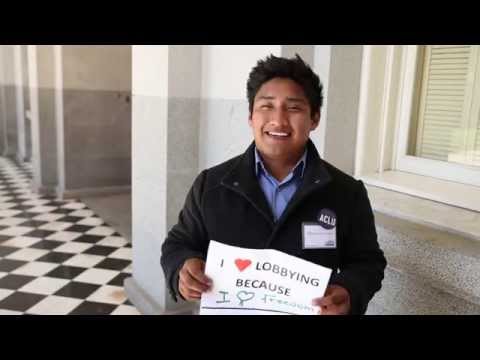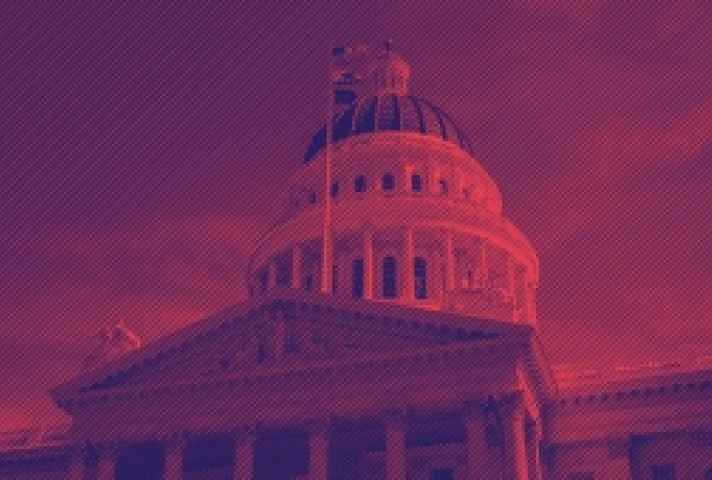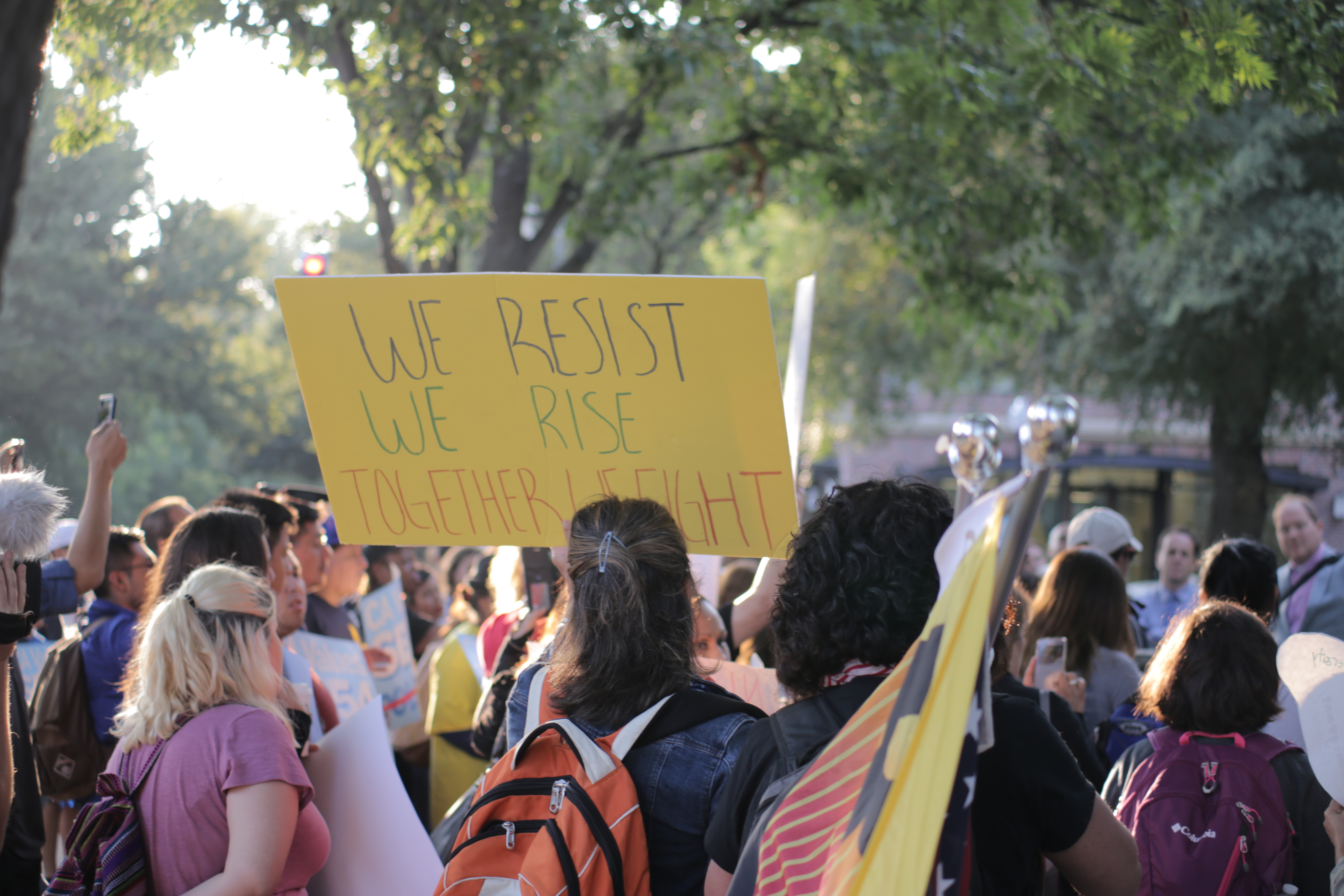Represent! Reclaim! Realize!
Join hundreds of activists at the state capital to learn about local and statewide campaigns that will advance a progressive agenda in the new year. Our communities may face serious civil liberties threats, but with a diverse population of nearly 38 million people of all races, faiths, sexual orientations, gender identities, and immigration status, California will not waver.
Learn how to build grassroots political power for civil liberties and social justice. Then, lobby your state senator and assemblymember, urging them to pass critical legislation that would protect and expand the civil liberties of all Californians.


Conference & Lobby Day begins at 10:30 a.m. on Sunday, April 8, and concludes at 4 p.m. on Monday, April 9.
General registration details
ACLU members pay $50
Non-members pay $70 (click to join ACLU)
RSVP now!
Groups, questions, and special accommodations
If you have questions about the conference, registration, travel grants, hotel arrangements, or accessibility accommodation requests (materials, translation, on-site interpretation, and more), please contact Steven Medeiros at smedeiros@aclunc.org.
Workshop information
Demystifying the Money Bail System
Presenter: Destiny Lopez, Criminal Justice Fellow, ACLU of San Diego & Imperial Counties
Navigating the criminal justice system after someone has been arrested can be overwhelming and confusing. In this workshop, we will demystify the money bail system. We’ll demonstrate how to Court Watch and monitor exactly what happens in bail hearings. We’ll also review educational materials created to help impacted people navigate the criminal justice system once someone has been arrested, including what options exist for pretrial release and what to look out for when dealing with bail bond companies.
Meet Your DA Campaign!
Presenters: Yoel Haile, Criminal Justice Associate, ACLU NorCal; Ryan McClinton, Community Organizer, Sac Act
Did you know district attorneys (DAs) can help end mass incarceration? This workshop will discuss the role district attorneys have played in mass incarceration and what they can do to end it. We will discuss the ACLU's Hey, Meet Your DA! campaign and how we intend to turn the tide in California. Participants will walk away with some practical tools on how to hold DAs accountable and next steps on how to join the fight to end mass incarceration.
Unlock the Vote: Voting Rights in the Time of Mass Incarceration
Presenters: Esther Lim, Director, Jails Project: Justice inside, ACLU SoCal; Daisy Ramirez, OC Jails Project Coordinator, ACLU SoCal; Joe Paul, Vocational Services Administrator, SHIELDS for Families
As millions across the nation mobilize to fight voter suppression and educate people on voting rights, we’ll discuss a community that remains largely neglected: people who are locked up or impacted by the criminal justice system. We will explore and learn about ACLU SoCal's Unlock the Vote campaign, an effort to educate and register people who are jailed in Los Angeles and Orange County. Through strategic partnerships with community groups and government entities, the ACLU and our partners aim to get thousands of people engaged in the 2018 elections. We will share best practices and lessons learned while building the campaign. Participants will leave the workshop with practical tools to take home to their communities.
California Values: Working to Disentangle ICE and Local Law Enforcement in Your Community
Presenters: Raquel Ortega, Organizer, ACLU NorCal; Luis Nolasco, Community Engagement & Policy Advocate, ACLU SoCal; Jessica Cabrera Carmona, Organizer, San Joaquin Immigrant Youth Collective; Mitzie Perez, Program &Development Coordinator, Inland Empire Immigrant Youth Collective
Is California a 'sanctuary state?' This workshop explores how the newly passed California Values Act (SB 54) impacts immigrant communities and explores the ways in which local jurisdictions can go further in protecting people from ICE. The workshop will cover how to: advocate at the local level for better protective policies, conduct a meeting with your sheriff, and work with people at risk of deportation in your own communities. Participants will walk away from this workshop with the tools to ensure that SB 54 is implemented and upheld justly all over California.
Fighting Transphobia and Building Coalition Power
Presenters: Adrian Acencion Martinez, LGBTQ Community Engagement and Policy Advocate, ACLU SoCal; Kyle Sawyer, Executive Director, Building Allies Together
This interactive workshop will use videos, art, and activities to give people the skills to become allies or work in solidarity with transgender liberation movements. Participants will get an introduction to trans* identities and learn how systemic transphobia impacts the lives of Californians. This workshop was created by Transform California, a coalition that works to raise awareness on trans* issues and identities. The only way we can fight transphobia is together!
Voter Outreach for Community Power
Presenter: Irene Rojas-Carroll, Communications Manager, Bay Rising
Voter outreach is rarely about building lasting power in tandem with longtime grassroots organizations — but Bay Rising and Bay Resistance are doing exactly that. We’ll share why and how we build the long-term power of communities of color and working-class communities and do it through electoral work. We will offer opportunities for participatory learning and discussion and then point to concrete ways participants in the Bay Area can partner with us. Participants will walk away with a better understanding of integrated voter engagement and its role in the Resistance. Participants will also have the opportunity to join an existing team of civic engagement leaders in the Bay Area doing voter registration and signature gathering for strategic 2018 California ballot measures on school funding, voting rights, and college for all.
Solidarity or Savior Complex: Developing a Reflective Practice
Presenters: Beja Ailisheva & Gemma Donofrio, White Noise Collective
What is the difference between active solidarity and the charity/savior complex when working in court, legislative and/or community advocacy work? In this interactive workshop, we will examine both of these concepts, work through examples, engage with guiding questions we can use to elevate solidarity in our own organizing work, and walk away with resources and new commitments.
Difficult Conversations
Presenters: Beja Ailisheva, White Noise Collective
Every day, we face difficult conversations in our personal lives, our professional work, and our civil rights advocacy. We communicate about sensitive topics like confederate flags, voter registration, immigration, reproductive health care, and government surveillance — and it can be hard. This workshop is not about talking points. It's an opportunity to learn and practice skills and strategies to use in approaching these difficult conversations using dyads, role-playing, and discussion. We'll try out what feels challenging, in a relatively low-stakes and supportive environment, and allow ourselves time to debrief, reflect, and learn from each other.
Marijuana. Know Your Rights
Presenter: Jessica C. McElfresh, Criminal Defense Attorney, McElfresh Law, Inc.
Cannabis is legal, but there are still plenty of laws controlling who does what with it. Do you know your rights? We'll draw connections between drug law enforcement and racial justice, immigration, and the criminalization of poverty. You'll walk away from the workshop understanding what's legal and what's not with respect to cannabis use in California. We'll also provide informational materials that you can share with your friends and communities.
Can't make it?
Follow the #ACLUcon hashtag on Twitter, Instagram, and Facebook for updates.
Event Date
Sunday, April 8, 2018 - 10:30am toTuesday, April 10, 2018 - 3:45pm
Featured image

